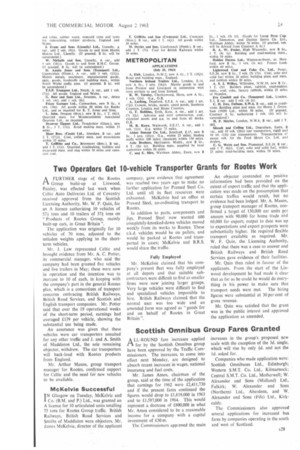Two Operators Get 10-vehicle Transporter Grants for Rootes Work
Page 31

If you've noticed an error in this article please click here to report it so we can fix it.
rtA FURTHER stage of the Rootes Group build-up at Linwood. Paisley, was effected last week when Celtic Auto Deliveries Ltd. of Coventry received approval from the Scottish Licensing Authority, Mr. W. F. Quin, for an A licence authorizing 10 vehicles of 571 tons and 10 trailers of 37+ tons on "Products of Rootes Group, mainly built-up cars, in Great Britain".
The application was originally for 10 vehicles of 70 tons, adjusted to the unladen weights applying to the shortterm vehicles.
Mr. J. Law represented Celtic and brought evidence from Mr. A. C. Potter, its commercial manager, who said the company had been granted five vehicles and five trailers in May; these were now in operation and the intention was to increase to 10 of each, in keeping with the company's part in the general Rootes plan, which is a consortium of transport concerns embracing British Railways, British Road Services, and Scottish and English transport companies. Mr. Potter said that over the 19 operational weeks of the short-term period, earnings had averaged £139 per vehicle, showing the substantial use being made.
An assurance was given that these vehicles were car transporters unsuited for any other traffic and J. and A. Smith of Maddiston Ltd., the sole remaining objector, withdrew. The car transporters will back-load with Rootes products from England.
Mr. Arthur Mason, group transport manager for Rootes, confirmed support for Celtic and the need for new vehicles to be available.
McKelvie Successful IN Glasgow on Tuesday, McKelvie and
Co. (B.M. and P.) Ltd., was granted an A licence for 10 articulated units totalling 75 tons for Rootes Group traffic. British Railways, British Road Services and Smiths of Maddiston were objectors. Mr. James McKelvie, director of the applicant company, gave evidence that agreement was reached two years ago to make no further application for Pressed Steel Co... Ltd. until all its fleet resources were exhausted. McKelvie had an office at Pressed Steel, co-ordinating transport to Rootes.
In addition to parts, components and jigs, Pressed Steel now wanted 600 completely-knocked-down vehicles moved weekly from its works to Rootes. These c.k.d. vehicles would be on pallets, and would be packed at Rootes and transported in cases; McKelvie and B,R.S, would share the traffic.
Fully Employed
Mr. McKelvie claimed that his company's present fleet was fully employed at all depots and that suitable subcontractors were difficult to find as smaller firms were now joining larger groups. Very large vehicles were difficult to find and specialized vehicles impossible to hire. British Railways claimed that the normal user was too wide and an amended form was agreed as "goods for and on behalf of Rootes in Great Britain". An objector contended no positive information had been provided on the extent of export traffic and that the application was made on the presumption that certain traffics would result, but no evidence had been lodged. Mr. A. Mason, group transport manager of Rootes, confirmed a target of 150,000 car units per annum with 90.000 for home trade and 60,000 for export; output to date was up to expectations and export prospects were substantially higher. He required flexible transport available as required. Mr. W. F. Quin, the Licensing Authority, ruled that there was a case to answer and British Railways and British Road Services gave evidence of their facilities.
Mr. Quin then ruled in favour of the applicants. From the start of the Linwood development he had made it clear that as far as he could he would do everything in his power to make sure that transport needs were met. The hiring figures were substantial at 30 per cent of gross revenue.
Mr. Quin was satisfied that the grant was in the public interest and approved the application as amended,




























































































